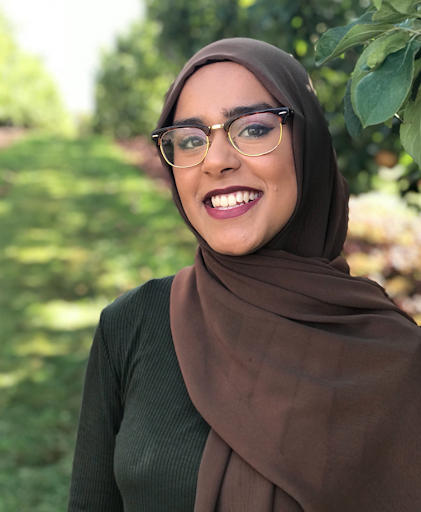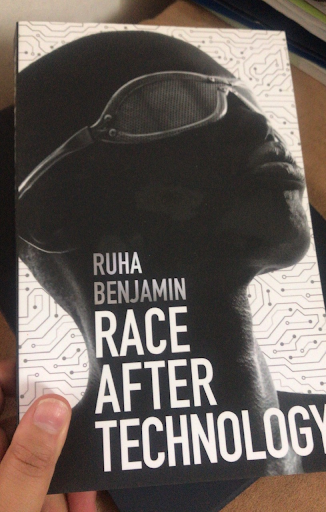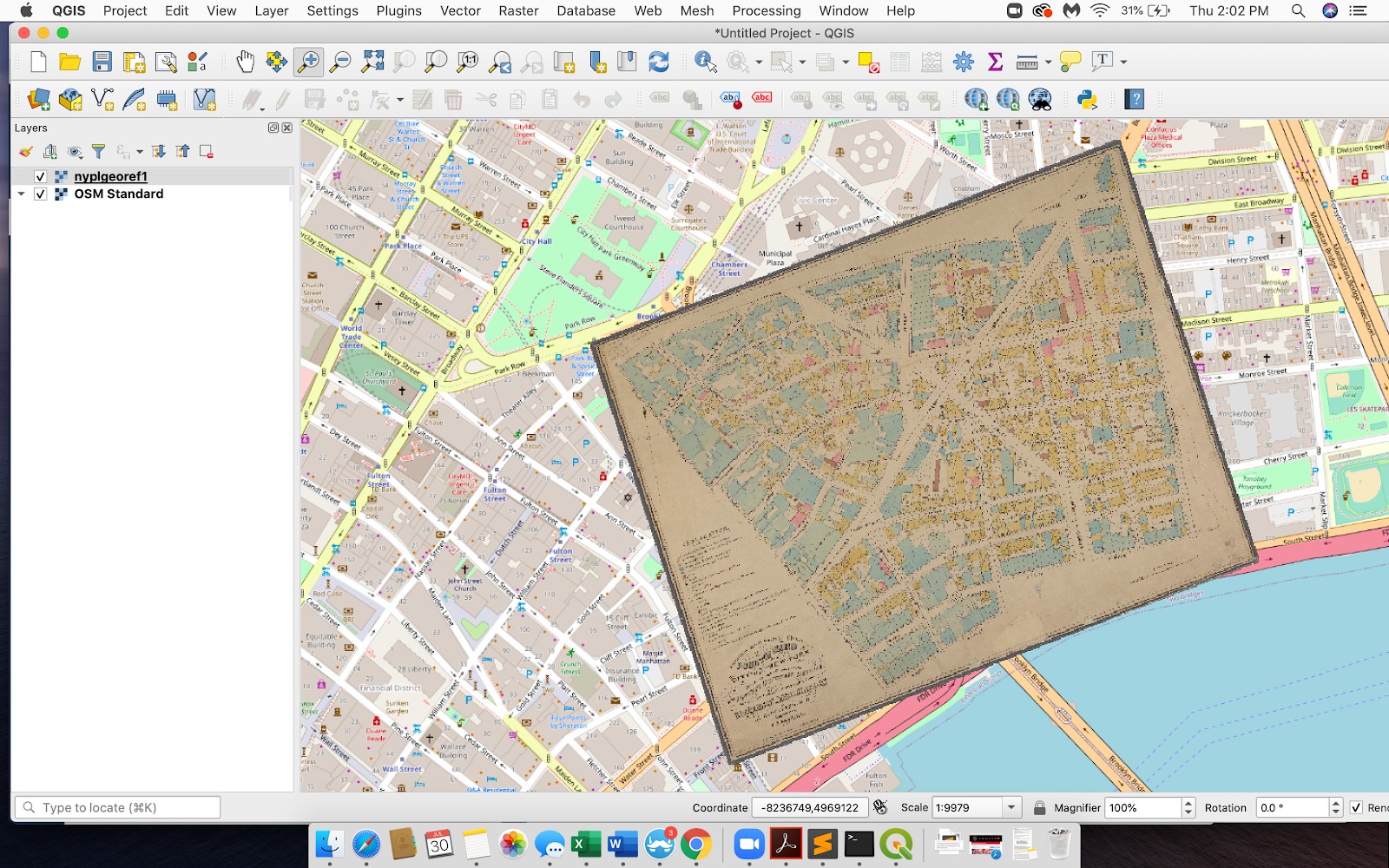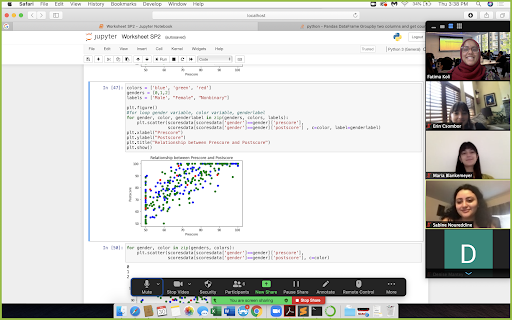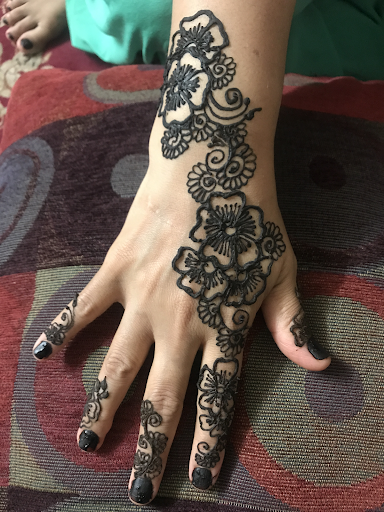This summer, Fatima Koli ’17 was promoted to associate director of Barnard’s Empirical Reasoning Center (ERC) following two years as a lab coordinator. In her new role overseeing the ERC, she provides direct and programmatic support for faculty to integrate empirical reasoning throughout the Barnard curriculum. Some of the ideas guiding her work include a focus on ethical data practices and strengthening collaboration with nonprofits and community organizations in Harlem to make sure the ERC engages with and learns from the surrounding community.
Koli’s educational background and deep knowledge of the College make her well-suited for the role — before working as the ERC’s lab coordinator, she attended Barnard herself. She majored in computer science, concentrating in urban and economic development, and minored in race and ethnicity studies. As part of the “Day in the Life of…” series, the associate director shares elements of her remote workday on July 30, including Python workshops, troubleshooting Google Sheets, and preparations for celebrating Eid al Adha at home.
3:45 a.m.: I wish I could say that my days always start this early, but this Thursday is different. It is the Day of Arafat, one of the most important days in Islam. Fasting is encouraged on that day, so I am awake early to have sehri, the morning meal before I start my fast. All of my family is up as well, so we eat together, pray, and then go back to sleep to get some rest before the day starts.
9 a.m.: Time to start the day for real! I am trying to avoid doomscrolling on Twitter (easier said than done), so I begin the day by reading from Ruha Benjamin’s Race After Technology: Abolitionist Tools for the New Jim Code. As a data scientist who is often critical of the field’s belief in tech as the solution to every problem, I love reading work by people who are in similar boats. Ruha is such a great writer that it is easy to become engrossed in the book. I have to force myself to put the book down so I can get to work!
9:30 a.m.: Since I have a Python workshop later in the day for the Science Pathways Scholars Program (SP)², I finish preparing the dataset and worksheet for the workshop. I also take stock of my inbox and try to send out as many responses as I can. Inbox zero is the dream, but I’m not quite there yet!
10:30 a.m.: We’re currently hiring undergraduate fellows at our center, and I want to get input from our Post-Baccalaureate Fellow Amelia Marcantonio-Fields ’20, who used to be an undergrad fellow herself. This year, the fellowship is more competitive than usual since we received so many amazing applications. Amelia and I discuss a few strategies for how to approach evaluating applicants, and we decide on next steps. I also touch base with her about our faculty workshops. Since I am going to be out of the office tomorrow [7/31], Amelia will take my place and teach her first QGIS workshop. We do a run-through so that she can get more comfortable with the content and I can give her tips to keep in mind while she’s teaching. She is nervous, but I know she’s going to do amazing tomorrow!
12:30 p.m.: Time for a break! I put on a pomegranate brightening face mask so that I can relax in between Zoom calls.
1 p.m.: I have a quick meeting with a colleague, Kayla McCaffrey from the Office of Institutional Funding and Sponsored Research, to discuss a proposal that we are collaborating on. I tell her about some of the challenges we foresee given the hiring freeze, and we come up with possible solutions to account for that. Kayla has been working on this for a few weeks now, so we’re excited that we are so close to finalizing the proposal.
1:30 p.m.: My friend at the library, Charlotte Price, reaches out to me with a quick data question, so I jump on a Zoom call to see what’s up. She is trying to make a few charts with Google Sheets, but the options do not seem flexible enough to create the charts she wants. I help her write some formulas that will make it easier for her. After that, we catch up and talk about upcoming plans. I haven’t talked to Charlotte since early on in quarantine, so it’s nice to check in with her.
2 p.m.: Time for my (SP)2 Python workshop! Today is the last workshop in a series of nine that focused on exploring descriptive statistics, data visualization, and data analysis in Excel and Python. The workshops have all been interactive, but they still mostly consisted of me teaching the students. For this final workshop, I ask them to “teach” me what to code or search in the documentation so that we can answer the questions I have written for them. We talk about what the past two months have been like. The biggest difference for all of them is how much more confident they feel about coding. Many of them had never used Python before and were quite nervous about doing so. But the pace of the workshops and coding along with me made them realize how doable it is. Even when they don’t know the answer to a question or the code for a specific chart, they know they can use Google search results and Python documentation to figure out the solution. This was our first run at developing a series of virtual workshops, so I’m very excited by how they went. (You can email erc@barnard.edu to stay up-to-date on our upcoming events!)
4 p.m.: Although I’ve been associate director for more than a month now, I have not had a chance to share my vision for the ERC with the Barnard community and the students that use our services. I think it’s important for students to know the philosophy and approach behind our work, especially in the current time. Without a critical perspective, data can be a tool to reinforce systems of power that hurt marginalized communities, even if this is done unintentionally. So I want to be intentional in my approach, and I want our students to do the same. I write up my vision and share it on the ERC website.
5:30 p.m.: Work for the day is done! I jump on a Zoom call, but this time with friends — all friends that I made during my undergraduate years at Barnard. We watch an episode of Legend of Korra together; we’ve made this our quarantine habit, and it’s the perfect way to relax after work! (P.S. I promise animated shows are not as bad as they seem.)
7 p.m.: I head to the kitchen to fry some chicken, while my mom makes brown rice and lamb chops. My mom wants to go all out since we are all fasting.
8:20 p.m.: We have iftari, the meal we break our fasts with. After that, I schedule a few emails to be sent out tomorrow. I usually try to keep some semblance of a work-life balance, even while we’re all working from home, but since I’m going to be out tomorrow and Monday, I want to make sure I send out a few things that are urgent and will help to schedule things for next week when I’m back at work.
10 p.m.: I end the day preparing for tomorrow’s holiday, Eid al-Adha. I try on a few clothes to figure out what I’ll be wearing. And finally, I put mehndi (henna) on my mom while my sisters put mehndi on each other. We’re all ready to have fun and eat lots of meat tomorrow, which is a staple for this Eid. Eid Mubarak to everyone also celebrating!
